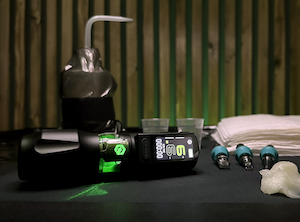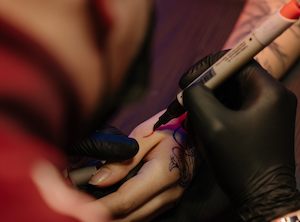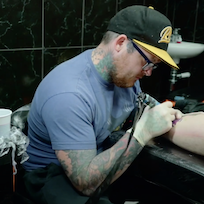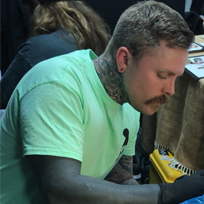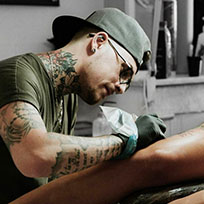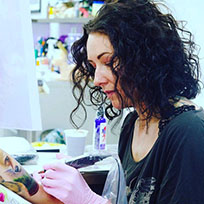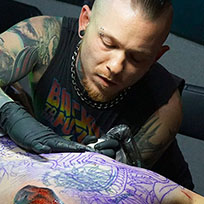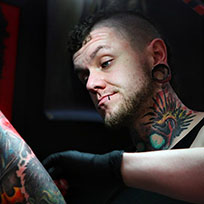- Make a business plan
- Find a location
- Source your equipment and supplies
- Make it legal
- Assemble your team
- Promote yourself
When you’re setting up a business, it can be really hard to know where to start. Opening a tattoo shop is no different and there are a lot of things to get your head around. As well as a business plan, you’ll need a location, equipment, supplies and you’ll need to get registered.
Although it can seem daunting, we’re here to offer some expert advice on what steps to take and how to start a tattoo business.
1. Make a business plan
First things first, you need to have a plan. Think sensibly and realistically about the cost of starting a business and try to ensure you can afford to run the business for at least three months, with or without profit. Then, identify what your goals are both short term and long term – and get specific. Think about how many clients you want to work with over the next three months and how much profit you would like to make.
You should also make a list of your outgoings in order to make a profit. For example, your rent, bills, wages and stock will all need to be accounted for before you can start to take money out of the business.

2. Find a location
Location, location, location. It’s an important decision to make and where you’re based can make a huge difference to the type of clientele you attract.
Do you want to be based on a high street for instance whereby walk-ins are quite common? Or, do you want to be slightly more out of the way so clients mainly find you through word of mouth or online?
You’ll also want to consider the cost of your rent. Certain areas will cost a lot more than others but if they result in a higher footfall, it might be worth it. Weigh up your options but realistically, you shouldn’t run before you can walk, so we would recommend you find somewhere with a good balance between being in a good area and being affordable.
3. Source your equipment and supplies
Obviously, you can’t run a tattoo shop without supplies. So, to make things a little bit easier, here’s a handy list of some bits you’ll need:
- Tattoo machines
- Tattoo needles and cartridges
- Tattoo ink
- Grips, tips and tubes
- Power supplies
- Bottles and containers
- Beds and stools
- Mirrors
- Paper towels
- Gloves
- Tapes and dressing
- Aprons
- Sinks
- Sterilisation and hygiene supplies
- Disposable razors
- Payment equipment, e.g. a card machine, a till and receipts
- Consent forms
- Décor, e.g. a sofa in the waiting area
All equipment is important, but some of it may actually be necessary for you to pass your health and safety inspection. Some councils require tattooists to have their own sinks, so if you have more than one tattoo artist working in your studio and only one sink, you could be in trouble.
Keep in mind too when you’re looking into flooring, worktops, etc., that these will all need to be smooth and non-porous so they are easily wiped.
4. Make it legal
Which leads us nicely on to the legal bit.
As a tattoo shop owner, you will be required to register with the appropriate organisations. In the UK, the licensing and procedures carried out in tattoo studios are subject to heavy regulation and local councils conduct regular inspections of premises to ensure that they are compliant with health and safety laws. It is in fact illegal for tattoo artists to tattoo without being licensed by their local council.
So, make sure you contact your local council and they will help you get in touch with the other organisations necessary such as the health and safety department.
You’ll also need to consider taking out relevant insurance. For help choosing the one best suited to you, take a look at our article on what insurance you need for a tattoo shop.
5. Assemble your team
When you’re first getting your team together, focus on two things – who you need and who you want.
How many artists do you want to work with? Will you hire a manager or receptionist? Do you need an accountant?
Work out how many people you can afford to work with and then start the hiring process.
When you’re doing your hiring, naturally, you’ll want to employ good artists, but before you start taking anyone on, think about the type of people you want to work with. Are they creative? Do they share your vision? Do they have good ethics? If these things are important to you, make sure you consider them well.
Think about the style of the artists you hire, too. After all, it could be more beneficial to have artists offering a range of styles in your shop as opposed to everyone doing the same thing.
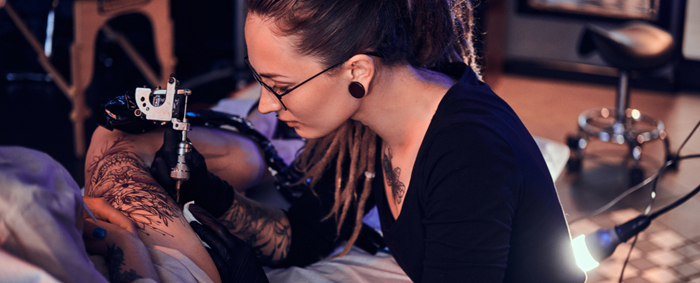
6. Promote yourself
Marketing and promotion is something you’ll need to get on top of straight away. In this day and age, marketing is half the job when you’re running a business, so it’s important you do it well. Let people know who you are, where you are and what you offer.
Find out what the best marketing strategies for tattoo shops are here.
In a nutshell, the best way to open a tattoo shop is to have a plan and stick to it. Starting any business is hard, but if you have the passion and determination to make it work, then you’re off to a good start.













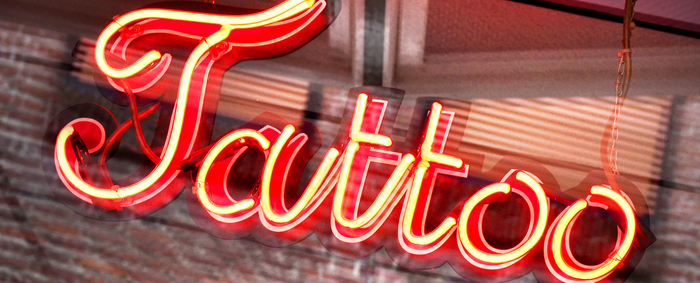
 What Is A Prince Albert Piercing?
What Is A Prince Albert Piercing?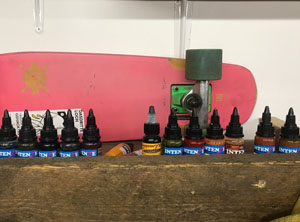 The Best Tattoo Ink 2024
The Best Tattoo Ink 2024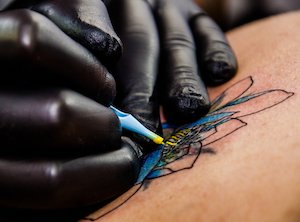 Tattooing Over Stretch Marks, Moles, Scars And Other Skin Conditions
Tattooing Over Stretch Marks, Moles, Scars And Other Skin Conditions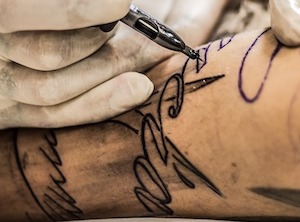 11 Best Fonts For Tattoos 2022
11 Best Fonts For Tattoos 2022 Advice For An Itchy Tattoo
Advice For An Itchy Tattoo
